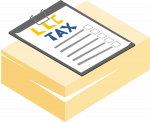Wisconsin LLC Taxes
Unless otherwise noted, a Wisconsin LLC will be taxed as a pass-through entity. What does that mean? Well, come tax season, business profits pass-through to members, who then report their earnings on their personal income taxes. Each member will be responsible for paying federal self-employment taxes (15.3%). In addition, members will need to be pay state and local taxes.
In this article, we'll cover:


How Are Wisconsin LLCs Taxed?
By default, the IRS will classify a single-member LLC (SMLLC) as a sole-proprietor. Multi-member LLCs (those with two or more owners) will be taxed as a partnership. If you keep your default tax status, here are the federal forms you’ll likely need to file:
- Single-member LLC—Form 1040 (usually Schedule C, but some SMLLCs file C-EZ, E, or F)
- Multi-member LLC—Form 1065
Wisconsin LLCs can also be taxed as an S-corp or a C-corp. However, the best classification for your LLC will depend on a number of factors. Below, we’ll breakdown your options, and how each one will affect your business.
Wisconsin LLCs taxed as S-corp
Although uncommon, some Wisconsin LLCs choose to elect S-corp status. Why? S-corp tax status allows your LLC to maintain it’s pass-through entity status and make pre-tax distributions to owners that will not be subject to the federal self-employment tax. But, before you elect a new tax status, you should know that S-corp status also means your taxes will become more complicated. We recommend seeking professional advice from a CPA before moving forward. They can help you determine whether or not S-corp status will benefit your company.
To change elect S-corp status, you’ll need to file Form 2553 with the IRS.
LLCs taxed as C-corp
LLCs that elect C-corp tax status are taxed as corporations. C-corps pay corporate income taxes and the owners pay self-employment taxes on the distributions they receive. This is referred to as “double taxation.” Although an uncommon tax election, the advantage is that C-corps are eligible for more tax breaks, which might be seen as a benefit to some larger LLCs. Again, we recommend consulting with a CPA on what’s best for your business before electing this status with the IRS.
C-corps file Form 1120 with the IRS.

Wisconsin State Income Tax
Wisconsin has a personal income tax that ranges from 3.54% to 7.56%, depending on the filer’s marital status and total annual income.
For single taxpayers:
3.54% for income between $0 – $12,760
$451.70 for income between $12,761 – $25,520 plus 4.65% of any amount over $12,760
$1,045.04 for income between $25,521 – $280,950 plus 5.3% of any amount over $25,520
$14,582.83 for income over $280,950 plus 7.65% of any amount over $280,950
For married taxpayers filing a joint return:
3.54% for income between $0 – $17,010
$602.15 for income between $17,011 – $34,030 plus 4.65% of any amount over $17,010
$1,393.58 for income between $34,031 – $374,600 plus 5.3% of any amount over $34,030
$19,433.79 for income over $374,600 plus 7.65% of any amount over $374,600
For married taxpayers filing separate returns:
3.54% for income between $0 – $8,510
$301.35 for income between $8,511 – $17,010 plus 4.65% of any amount over $8,510
$696.50 for income between $17,011 – $187,300 plus 5.3% of any amount over $17,010
$9,721.87 for income over $187,300 plus 7.65% of any amount over $187,300
If your Wisconsin LLC has chosen C-corp status, you will be responsible for either filing a Wisconsin corporate franchise tax or a net income tax, which are both taxed at 7.9%. You can find more information regarding both the franchise tax and income tax at the State of Wisconsin Department of Revenue website.

Sales and Use Tax
Wisconsin has a sales and use tax rate of 5%, which applies to the sale, lease, or rental of most goods and services.
All counties in Wisconsin, with the exception of Manitowoc, Racine, Waukesha, and Winnebago, charge an additional sales and use tax of .5%.

Local Wisconsin Taxes
Most counties in Wisconsin require businesses to pay an additional sales and use tax rate at .5%. However, Milwaukee County has special taxes referred to as Local Exposition Taxes that cover the following:
- Basic Room Tax (3%)
- Additional Room Tax (7% – Milwaukee City limits only)
- Food and Beverage Tax (.5%)
- Rental Car Tax (3%)
There’s also a Premier Resort Area tax for most retailers who do business in selected resort towns. You can find out what municipalities choose to fall under this tax status at the Wisconsin Department of Revenue website.

Other Taxes in Wisconsin
Below are additional taxes imposed by the state of Wisconsin.
Wisconsin State Employer Taxes
Wisconsin employers will need to pay unemployment insurance and workers’ compensation taxes:
- Unemployment Insurance (UI) Tax—Tax rates range anywhere from .12% to 12%. The taxable wage base is $14,000. You can find the exact breakdown of UI tax rates on the Wisconsin Department of Workforce Development page.
- Workers’ Compensation—Wisconsin requires most businesses that employ three or more employees to purchase workers’ compensation insurance. The state of Wisconsin does not provide worker’s compensation insurance coverage. You must obtain workers’ compensation through a private insurance company.
To learn more about purchasing Wisconsin workers compensation, visit the Wisconsin Department of Workforce Development page.
Industry Taxes
Industry taxes (excise taxes) are additional taxes the Wisconsin Department of Revenue charged to businesses who sell or provide services in specific industries. You’ll need to pay more taxes if you’re Wisconsin LLC deals in these services or items:
- Alcohol
- Beer
- Liquor
- Tobacco products
- Fuel taxes
- Alternate fuels
- Aviation fuel
- Biodiesel fuel
- Motor Vehicle fuel
- Petroleum Inspection fee

Do foreign LLCs in Wisconsin need to pay Wisconsin taxes?
Yes. If you have a Wisconsin Foreign LLC—which does business in Wisconsin, but was initially formed in a different state—you still have to pay Wisconsin state and local taxes.





